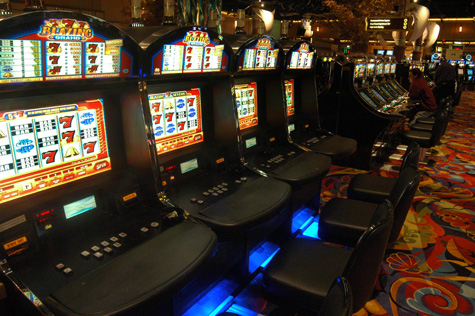
MONEYMAKER? A state heavily dependent on slot revenue is moving to protect its haul. |
Just three years after Rhode Island voters killed plans for a full-scale, Vegas-style casino, big-time gambling is in the cards again.
House Speaker William J. Murphy, who backed the last casino push, and Governor Carcieri, who opposed it, have both suggested that voters take up the issue anew.
And if lawmakers place the question on the ballot next year, as expected, observers are betting that Rhode Islanders will say "yes" to poker and craps this time around.
The local economy is in tatters, after all. The state budget is a mess. And the threat of competition from Massachusetts, where Governor Patrick and the legislature seem hellbent on legalized gambling, is also expected to spur a recession-weary electorate.
Of course, Rhode Island already has a pair of slot parlors in place — Twin River, in Lincoln, and Newport Grand, in the City by the Sea. But gambling proponents say the halls, a significant source of revenue for the beleaguered state government, will wither in the face of Bay State competition unless they make the transition to full-scale casinos.
Rhody, they say, needs cards and dice to stay in the game. To stay solvent, for that matter.
But are voters really ready to go Siegfried & Roy so soon after rejecting casino gambling? And can tigers, roulette, and an army of cocktail waitresses do much to save a state on the brink anyhow?
WHAT HAPPENED IN VEGAS
Before our present bout with economic calamity, gambling was thought to be a recession-proof industry; even the 9/11 attacks couldn't keep the high-rollers away for long.
But all that has changed.
In Las Vegas, convention business is down sharply. MGM Mirage and Dubai World have slashed condominium prices by 30 percent at their gleaming CityCenter development. Even Cirque du Soleil, the acrobatics powerhouse that operates six shows along the Strip, has been forced to offer steep discounts.
In Atlantic City, meanwhile, three of the town's 11 casinos are in bankruptcy protection. And Connecticut's mega-casinos aren't faring much better.
Foxwoods, once a $1 billion-per-year machine, laid off 700 employees last fall and is creaking under the weight of more than $2 billion in debt from overexpansion. Mohegan Sun has suspended construction on a $734 million hotel tower that promised to be the tallest building in the state.
The industry's organizing principle — build ever-larger and ever-glitzier attractions for an ever-expanding pool of visitors — has proven deeply flawed.
But, experts caution, it's important not to overstate the case. "I still believe there are components of gaming that are recession resilient," says David Berman, CEO of Regal Capital Advisors, a boutique investment bank in Los Angeles that focuses on real estate, gaming, and lodging.
Regional or "convenience" gambling has fared reasonably well during the downturn, for instance, relying on cash-strapped staycationers unwilling to gas up the car for trips to flashier, more expensive venues.
Indeed, Twin River — awash in bad press after falling into bankruptcy in the wake of an overly ambitious expansion — is actually performing rather well on the betting floor these days. In November 2007, just before the official start of the recession, the parlor netted almost $25.4 million in slot income. Last month, it pulled in $31.9 million, an increase of some 25 percent.